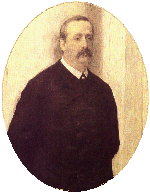| Alexander Porfir'yevich Borodin (1810-1849) | |
|
Epoch: Romantic Country: Russia voor meer portretten en dergelijke:
|
| Doctor Alexander Borodin,
a professor of chemistry at the St. Petersburg Academy of Medicine, was
the son of a Georgian prince.
He became a member of the group (with Cui, Rimski-Korsakov, Balakirev and Moussorgsky) known as the Moguchaya Koochka (the Five or the Mighty Handful) as the Russian critic and librarian Vladimir Stasov called them, who promoted national music in the latter part of the 19th century following the example of Glinka, their forerunner. Borodin was a less prolific composer than the other
members of the group as chemistry took up most of his time. At his death,
he left a number of works unfinished which were completed by his friend
Rimsky-Korsakov and others.
It includes the famous choral dances, the "Polovtsian Dances", with which the captive Prince is entertained by Khan Konchak. His best known orchestral music includes the tone poem "In the Steppes of Central Asia", a vivid evocation of an exotic region. - MIDI FILE - "In the Steppes of Central Asia" (6'14'') The second of his three symphonies occupied him intermittently
for 7 years and is an attractive and very Russian work. These three symphonies
(the last unfinihsed) form an important addition to nationalist symphonic
repertoire.
|
